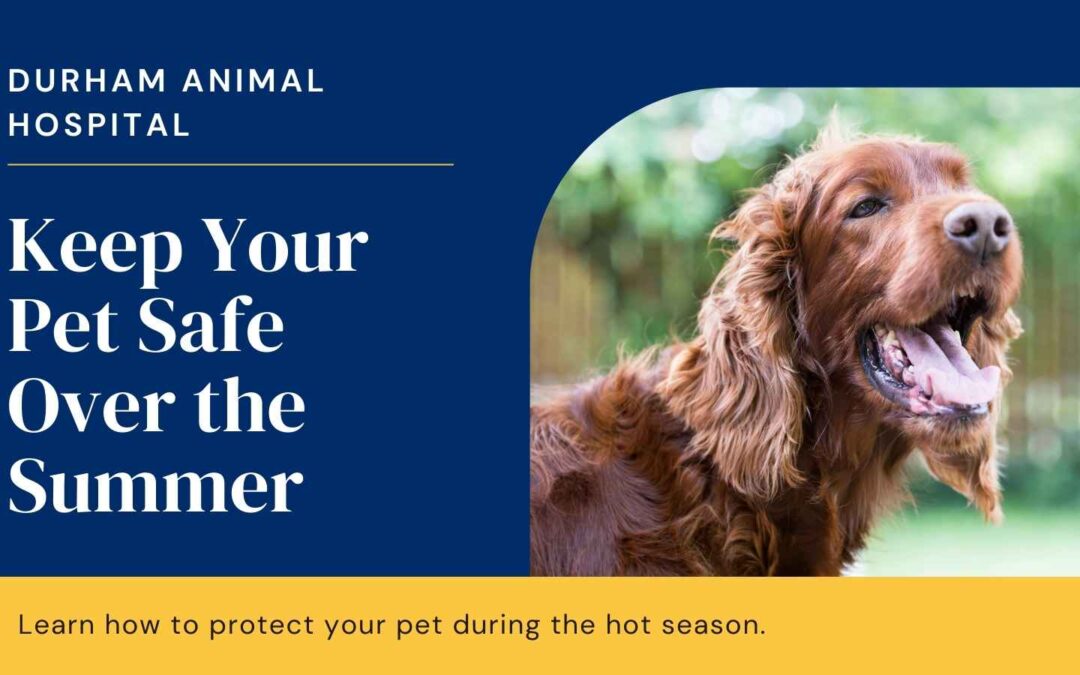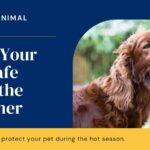Keep Your Pet Safe Over the Summer – The summer sun invites you to play. Beach trips, backyard barbeques, and dips in the pool are what make summertime the best time of year! Along with all the fun, the summer also brings a risk of overheating and dehydration. You can follow your body’s cues when it’s time to cool off. But what about your pet? Since your pet’s body works differently than yours, it’s not as easy for you to tell when they are in danger.
Follow these helpful tips to keep your pet safe in the summer heat:
- Keep your pet at home when you are running errands. Even if the outside temperature doesn’t feel too hot, the inside of the car heats up quickly. Do not leave your pet in your car–even for a few minutes! Leaving the window open a crack is not sufficient. Portable fans don’t cool off an animal’s body as well as they cool off a person’s body. It’s best to leave your pet at home in the comfortable cool.
- Stay off the hot asphalt. Your pet’s paws are tough yet tender. Imagine what it would be like for you to walk on the blacktop surface with bare feet. Ouch! Find a walking path that is shaded from the direct sun.
- Keep your pet hydrated. Give your dog and cat unlimited access to fresh drinking water. Although this should be the case all year long, your pet will need more water in the summer months to stay hydrated.
- Watch the humidity. Dogs pant to keep themselves cool, which releases moisture from their bodies. If the air is already moist, it’s harder for dogs to expel moisture from their bodies. Limit your outside time on days with high humidity.
- Exercise in the cooler parts of the day. Early in the morning and late in the evening are the best times. If you have been outside, be sure to check your animals for ticks and other pests.
A word about your dog and hydration:
When a dog is overly heated and panting heavily, it’s important to offer them water, but there are some guidelines to follow to ensure their safety:
- Cool the dog gradually: Avoid giving large amounts of water all at once. Instead, offer small amounts frequently. This helps to prevent gulping, which can lead to vomiting or bloat, especially in larger breeds.
- Use cool, not cold, water: Extremely cold water can cause the blood vessels to constrict, potentially leading to shock. Cool water helps to lower the body temperature more safely.
- Avoid forcing the dog to drink. Let them drink at their own pace. Forcing water can cause aspiration or further stress the dog.
Keep your pet safe from these summer hazards:
- Avoid fireworks. Think about it. Fireworks are loud for your ears. Your pet’s hearing is much more sensitive than yours. Plus, if you are setting off fireworks at home, there is a chance that your pet could be exposed to the dangerous chemicals inside the fireworks.
- Be vigilant at summer picnics. Picnic food is not always safe for your pet. Not every picnic guest will know what your pet can and cannot eat. Even if they do, little hands may drop food, leaving it free for a pet to gobble up without your knowledge.
- Make sure the chemicals used in your yard, flower beds, and vegetable gardens are safe for pets. Also, keep the lawn and garden products out of reach of your pet.
Following these tips will keep your pet safe through the summer.
Monitor for signs of heat stroke: If your dog shows signs of heat stroke (excessive panting, drooling, weakness, vomiting, or collapse), seek veterinary care immediately.
If, for any reason, you suspect your pet is suffering from dehydration or a heat-related illness or may have ingested or been in contact with any harmful material, do not hesitate to call the offices of Dr. Jim Miller, Veterinarian, at Durham (919) 620-7387 or North Churton (919) 644-7387 Animal Hospital.
Find us on Facebook:
Refreshed blog: June 2024






